6 books about Grid
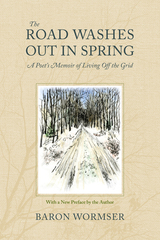
The Road Washes Out in Spring
A Poet’s Memoir of Living Off the Grid
Baron Wormser
Brandeis University Press, 2023
A new edition of an evergreen back-to-nature book in the tradition of Thoreau.
For nearly twenty-five years, poet Baron Wormser and his family lived in a house in Maine with no electricity or running water. They grew much of their own food, carried water by hand, and read by the light of kerosene lamps. They considered themselves part of the “back to the land” movement, but their choice to live off the grid was neither a statement nor a protest: they simply had built their house too far from the road and could not afford to bring in power lines. Over the years, they settled into a life that centered on what Thoreau would have called “the essential facts.” In this graceful meditation, Wormser similarly spurns ideology in favor of observation, exploration, and reflection. “When we look for one thread of motive,” he writes, “we are, in all likelihood, deceiving ourselves.” His refusal to be satisfied with the obvious explanation, the single thread of motive, makes him a keen and sympathetic observer of his neighbors and community, a perceptive reader of poetry and literature, and an honest and unselfconscious analyst of his own responses to the natural world. The result is a series of candid personal essays on community and isolation, nature, civilization, and poetry. Lovely and rich, The Road Washes Out in Spring is an immersive read. A new preface by the author rounds out this new edition.
For nearly twenty-five years, poet Baron Wormser and his family lived in a house in Maine with no electricity or running water. They grew much of their own food, carried water by hand, and read by the light of kerosene lamps. They considered themselves part of the “back to the land” movement, but their choice to live off the grid was neither a statement nor a protest: they simply had built their house too far from the road and could not afford to bring in power lines. Over the years, they settled into a life that centered on what Thoreau would have called “the essential facts.” In this graceful meditation, Wormser similarly spurns ideology in favor of observation, exploration, and reflection. “When we look for one thread of motive,” he writes, “we are, in all likelihood, deceiving ourselves.” His refusal to be satisfied with the obvious explanation, the single thread of motive, makes him a keen and sympathetic observer of his neighbors and community, a perceptive reader of poetry and literature, and an honest and unselfconscious analyst of his own responses to the natural world. The result is a series of candid personal essays on community and isolation, nature, civilization, and poetry. Lovely and rich, The Road Washes Out in Spring is an immersive read. A new preface by the author rounds out this new edition.
[more]
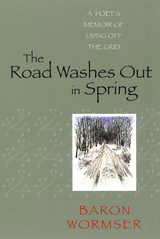
The Road Washes Out in Spring
A Poet’s Memoir of Living Off the Grid
Baron Wormser
University Press of New England, 2008
For nearly twenty-five years, poet Baron Wormser and his family lived in a house in Maine with no electricity or running water. They grew much of their own food, carried water by hand, and read by the light of kerosene lamps. They considered themselves part of the “back to the land” movement, but their choice to live off the grid was neither statement nor protest: they simply had built their house too far from the road and could not afford to bring in power lines. Over the years, they settled in to a life that centered on what Thoreau called “the essential facts.” In this graceful meditation, Wormser similarly spurns ideology in favor of observation, exploration, and reflection. “When we look for one thread of motive,” he writes, “we are, in all likelihood, deceiving ourselves.” His refusal to be satisfied with the obvious explanation, the single thread of motive, makes him a keen and sympathetic observer of his neighbors and community, a perceptive reader of poetry and literature, and an honest and unselfconscious analyst of his own responses to the natural world. The result is a series of candid personal essays on community and isolation, nature, civilization, and poetry.
[more]
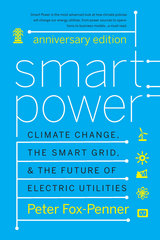
Smart Power Anniversary Edition
Climate Change, the Smart Grid, and the Future of Electric Utilities
Peter Fox-Penner
Island Press, 2014
Few industries in the U.S. are as stuck in the past as our utilities are. In the face of growing challenges from climate change and the need for energy security, a system and a business model that each took more than a century to evolve must now be extensively retooled in the span of a few decades. Despite the need, many of the technologies and institutions needed are still being designed or tested. It is like rebuilding our entire airplane fleet, along with our runways and air traffic control system, while the planes are all up in the air filled with passengers.
In this accessible and insightful book, Peter Fox-Penner considers how utilities interact with customers and how the Smart Grid could revolutionize their relationship. Turning to the supply side, he considers the costs of, and tradeoffs between, large-scale power sources such as coal plants and small-scale power sources close to customers. Finally, he looks at how utilities can respond to all of these challenges and remain viable, while financing hundreds of billions of dollars of investment without much of an increase in sales.
Upon publication, Smart Power was praised as an instant classic on the future of energy utilities. This Anniversary Edition includes up-to-date assessments of the industry by such leading energy experts as Daniel Estes and Jim Rogers, as well as a new afterword from the author. Anyone who is interested in our energy future will appreciate the clear explanations and the in-depth analysis it offers.
In this accessible and insightful book, Peter Fox-Penner considers how utilities interact with customers and how the Smart Grid could revolutionize their relationship. Turning to the supply side, he considers the costs of, and tradeoffs between, large-scale power sources such as coal plants and small-scale power sources close to customers. Finally, he looks at how utilities can respond to all of these challenges and remain viable, while financing hundreds of billions of dollars of investment without much of an increase in sales.
Upon publication, Smart Power was praised as an instant classic on the future of energy utilities. This Anniversary Edition includes up-to-date assessments of the industry by such leading energy experts as Daniel Estes and Jim Rogers, as well as a new afterword from the author. Anyone who is interested in our energy future will appreciate the clear explanations and the in-depth analysis it offers.
[more]
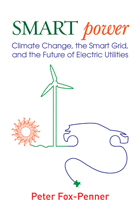
Smart Power
Climate Change, the Smart Grid, and the Future of Electric Utilities
Peter Fox-Penner
Island Press, 2010
A new national policy on climate change is under debate in the United States and is likely to result in a cap on greenhouse gas emissions for utilities. This and other developments will prompt utilities to undergo the largest changes in their history. Smart Power examines the many facets of this unprecedented transformation.
This enlightening book begins with a look back on the deregulatory efforts of the 1990s and their gradual replacement by concerns over climate change, promoting new technologies, and developing stable prices and supplies. In thorough but non-technical terms it explains the revolutionary changes that the Smart Grid is bringing to utility operations. It also examines the options for low-carbon emissions along with the real-world challenges the industry and its regulators must face as the industry retools and finances its new sources and systems.
Throughout the book, Peter Fox-Penner provides insights into the policy choices and regulatory reform needed to face these challenges. He not only weighs the costs and benefits of every option, but presents interviews with informed experts, including economists, utility CEOs, and engineers. He gives a brief history of the development of the current utility business model and examines possible new business models that are focused on energy efficiency.
Smart Power explains every aspect of the coming energy revolution for utilities in lively prose that will captivate even the most techno-phobic readers.
This enlightening book begins with a look back on the deregulatory efforts of the 1990s and their gradual replacement by concerns over climate change, promoting new technologies, and developing stable prices and supplies. In thorough but non-technical terms it explains the revolutionary changes that the Smart Grid is bringing to utility operations. It also examines the options for low-carbon emissions along with the real-world challenges the industry and its regulators must face as the industry retools and finances its new sources and systems.
Throughout the book, Peter Fox-Penner provides insights into the policy choices and regulatory reform needed to face these challenges. He not only weighs the costs and benefits of every option, but presents interviews with informed experts, including economists, utility CEOs, and engineers. He gives a brief history of the development of the current utility business model and examines possible new business models that are focused on energy efficiency.
Smart Power explains every aspect of the coming energy revolution for utilities in lively prose that will captivate even the most techno-phobic readers.
[more]
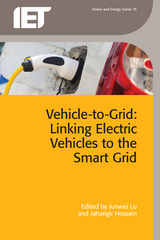
Vehicle-to-Grid
Linking electric vehicles to the smart grid
Junwei Lu
The Institution of Engineering and Technology, 2015
Plug-in electric and hybrid vehicles (PEVs) have the potential to provide substantial storage to a city's grid, a key component in mitigating intermittency issues of power sources. But the batteries of these vehicles also need to be charged at times when their users need them. Thus, V2G (vehicle-to-grid) is becoming an important issue in the future grid. An integrated treatment of this system, from power generation, monitoring, storage in stationary and PEV batteries to control is a complex task.
[more]
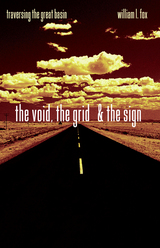
The Void, The Grid & The Sign
Traversing The Great Basin
William L. Fox
University of Nevada Press, 2005
This is a story that few know, but those who do are its disciples. The story, of the highest and driest of all American deserts, the Great Basin, has no finer voice than that of William Fox. Fox’s book is divided into the three sections of the title. In “The Void,” he leads us through the Great Basin landscape, investigating our visual response to it—a pattern of mountains and valleys on a scale of such magnitude and emptiness and undifferentiated by shape, form, and color that the visual and cognitive expectations of the human mind are confounded and impaired. “The Grid” leads us on a journey through the evolution of cartography in the nineteenth century and the explorations of John Charles Frémont to the net of maps, section markers, railroads, telegraph lines, and highways that humans have thrown across the void throughout history. “The Sign” wends us through the metaphors and language we continue to place around and over the void, revealing the Great Basin as a palimpsest where, for example, the neon boulevards of Las Vegas interplay with ancient petroglyphs. In this one-of-a-kind travel book that allows us to travel within our own neurophysiological processes as well as out into the arresting void of the Great Basin, Fox has created a dazzling new standard at the frontier of writing about the American West. His stunning and broad insight draws from the fields of natural history, cognitive psychology, art history, western history, archaeology, and anthropology, and will be of value to scholars and readers in all these subjects.
[more]
READERS
Browse our collection.
PUBLISHERS
See BiblioVault's publisher services.
STUDENT SERVICES
Files for college accessibility offices.
UChicago Accessibility Resources
home | accessibility | search | about | contact us
BiblioVault ® 2001 - 2024
The University of Chicago Press









